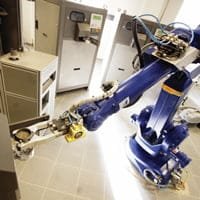
A Nottingham County Surveyor, Edgar Purnell Hooley, discovered tarmac by accident in the early 20th century. He found a barrel of tar had spilt onto the road at a local ironworks. This had mixed with waste slag from the furnaces. The result was a dust-free, strong surface. Hooley created and patented the product that could take the weight of the new automobile. In 1903 the Tarmacadam syndicate was formed, its name is taken from the developer of the road construction system, John MacAdam.
The Tarmac Group is now a large and complex company and is organised into three businesses:
- Tarmac Quarry Materials ready mixed concrete, asphalt, aggregates, lime, cement and contracting services
- Tarmac Building Products mortar, screed, masonry, packed and precast products
- International.
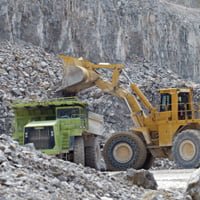
To manage its business Tarmac has a clear strategic framework and one important element of this is having the right people with the right skills in the business. It is Tarmac’s core belief that its people make the difference and enable the business to be the leader in its chosen markets. It aims to have motivated people all working together as one team across its business units and functions in support of its vision to ‘achieve the exceptional’.
To deliver exceptional value, Tarmac focuses on five big goals which are clearly defined and easily remembered as the mnemonic ‘DREAM’:
- Develop markets – and grow by working closely with key customers
- Reduce costs – and be well positioned for the future
- Engage employees – to work as one team and each achieve its full potential
- Act responsibly – and be safe in everything that is done
- Manage assets – to get the most out of its investments.
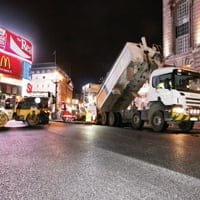
Each goal has a few targeted strategies. Each strategy has clear actions, targets and measures in order to be relevant to employees and described in a way that is understandable by all.
For example, Tarmac targets and measures a reduction in waste sent to landfill as part of its sustainability strategy in order to reach its goal to ‘Act responsibly’. It wants all employees to bring their expertise, enthusiasm and commitment to the activities that will deliver most value in support of the company’sobjectives.
This case study focuses on how the people in Tarmac Quarry Materials deliver the highest value for customers, communities, employees and investors.
Organisation structure, roles and functions
Tarmac has set in place an organisational structure that provides clear lines of control, responsibility and communication.

In a business as large and diverse as Tarmac, there are many different jobs. Its structure is complex, so to help individuals within the business understand their roles and responsibilities, Tarmac has a set of Business Principles that demonstrate its commitment to operating ethically and responsibly. This helps everyone understand where his or her role contributes to overall performance and enables the whole workforce to work together to achieve the business’ aims and objectives.
Within each area, there are three main levels of staff.
- Managers – organise and plan their departments to exceed the expectation of internal and external customers. They work closely with other managers across the company to promote a range of benefits, including; continuous process improvements, improving accuracy, reducing the need to repeat work and driving up efficiency year on year.
- Supervisors – work with managers to ensure that operators apply procedures and practices consistently. This involves using best practice to create value-added services across the business.
- Operators – are responsible for day-to-day operations of the business. This is the level at which a university graduate might enter the organisation in order to learn all aspects of the business. The role requires accuracy, efficiency and a high level of individual responsibility.

The Operations function at Tarmac is key to overall business performance. This is where a number of processes come together to make the products and services to satisfy customer needs.
However, the Operations function needs the support of services in:
- Finance – to manage the flow of money across the business. Finance managers produce financial and management accounts not only to ensure legal compliance but also to contribute to the strategic decision-making process by forecasting financial performance. Budgets enable Operations to have the resources (raw materials, equipment and people) to carry out processes.
- Human Resources (HR) This includes planning and forecasting staff requirements and managing recruitment and selection. The HR team ensures that managers apply HR policies and procedures consistently across the business. The development of staff is a key priority within the Tarmac business. Without the right people, Operations may not be able to achieve targets.
Additionally, Tarmac also needs the services of:
- Marketing by understanding customer needs, the marketing function can inform the overall business strategy and ensure that the Tarmac image and brand reflect its high quality.
- Procurement is the acquisition of goods and/or services at the best possible price. Within Tarmac this function secures cost effective contracts and establishes long term partners to ensure business continuity.
- IT services install equipment and applications, manage databases and computer networks to provide the business with strong and effective information and communication channels.
The operations function
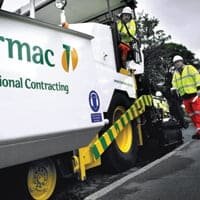
The Operations function brings together raw materials with the production process to make products that customers need. It also shares ideas across the company about how to improve processes and achieve cost savings.
The benefits include increased efficiency and more effective management of health and safety and environmental issues. For example, Tarmac is implementing sustainable projects such as restoring quarries after use.
This commitment is important not only commercially but also as part of Tarmac’s corporate and social responsibility programme as some of its quarries are within the boundaries of National Parks. In 2008, its work supporting biodiversity was recognised with an award from The Wildlife Trusts.

Tarmac has a typically hierarchical structure with seven levels:
It is essential for Tarmac to have the right people in place in order to achieve competitive advantage. It recruits apprentices and graduates into key roles across the business and specifically within Operations:
- An apprentice would join Tarmac as an Operator and would gain the relevant job skills and experience during their four-year apprenticeship.
- Similarly, a graduate trainee would learn through “shadowing” a Section Leader during their training period.
Once qualified, progression within the business is steady ensuring that the employee has acquired the right skills and knowledge before moving to the next challenge or role.
A Zone Manager’s role is critical and includes managing operational performance across several levels and within a large geographical area. A Zone Manager needs to understand all aspects of the business in order to meet and improve targets for cost, quality, delivery, safety and business integrity shown in agreed key performance indicators (KPIs).
All staff in the zone need to understand their roles in helping to meet these KPIs. It is the Zone Manager’s job to help get the best performance from the team by:
- motivating the team through coaching and leadership
- identifying priorities for continuous improvement
- encouraging and rewarding staff who contribute improvement ideas and actions
- emphasising the importance of developing skills and capabilities.
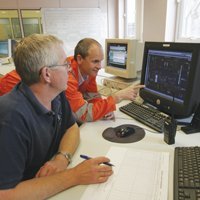
Tarmac’s long-term aim is to develop high performance teams who work within a culture of quality and continuous improvement. Tarmac employees have the opportunity to contribute their ideas on how to achieve results. They can do this through the employee suggestion scheme or by presenting ideas to managers to discuss within development teams. This helps individuals feel part of the wider team, allows them to gain a greater understanding of the business and strengthens employee engagement and commitment to the organisation.
Claire Leggat – Plant Manager – ‘I joined Tarmac because I wanted a practical and varied role and one where I could see results. I have responsibility for three quarries. This is potentially a high-risk environment so a key part of my job is to manage health & safety and operational performance for the sites. There are always new things to learn, which is very satisfying. Tarmac has a policy of getting involved with the communities in which it operates, so, for example, I have responsibility for monitoring impacts on the local environment and am an accredited Great Crested Newt handler!’
The finance function
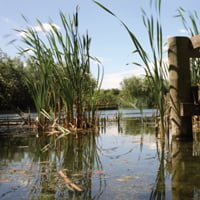
Sound financial management is critical to a business. Financial reporting is a major part of this function. Tarmac has different routes for people to join the company, at both graduate level and through apprenticeship schemes. Graduate trainees enter this support function at Operator level.
Lisa McKenzie Credit Control Supervisor – ‘I originally joined Tarmac many years ago on an apprenticeship scheme I love the business and am very happy here. As a Credit Control Supervisor, I have a very clear focus. My job is business critical without money coming in, the company cannot run properly. My favourite parts of my job are definitely the ‘people contact’, plus seeing the rewards of what you do immediately. Every day brings a different challenge. I need to be flexible to find solutions to whatever problems come my way.’
Standards of reporting and accounting need to be the same across all parts of Tarmac. This is so that the business has a clear and accurate picture of its performance. This is a huge task and good team working is essential to ensure that operators, supervisors, managers and the financial controller all follow the same practices.
Simon Howell UK Credit Control Manager – ‘I joined Tarmac because I liked its approach although it is the biggest company in its field, it has a more ‘co-operative’ spirit. Every time I see a Tarmac lorry, I get a sense of pride at being a part of the company. In my job I need to balance individual accounts alongside the corporate budget so I deal not just with money but also with our customers this gives me the biggest buzz.’
The Human Resources function
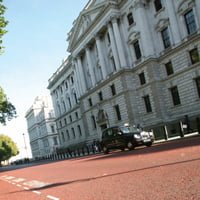
Human Resources Management is an important asset to any business. It provides expertise in:
- managing change and facilitating training and development
- recruitment, selection and employee relations
- pensions and benefits
- communicating with employees.
Tarmac believes in ‘bringing out the best in all our people, allowing them to realise their full potential’. It promotes and encourages a culture of learning and development throughout the business.
Tarmac aims to build the capacity and capability of its people to achieve their full potential. This strategy strengthens the business in the long term. The Talent and Development team, which is part of the HR function, leads and coordinates training, learning and development opportunities. These enable people at all levels to acquire and practice high levels of skill and expertise. This means individuals can achieve their personal goals, as well as contributing to the wider mission and visionof the organisation.
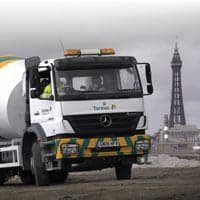
An HR manager’s role is to ensure that business managers apply HR policies and procedures consistently through all business units. This helps to develop partnerships across different teams, which supports corporate aims and objectives.
Damian McKenna Area HR Manager North and Scotland – ‘I joined Tarmac because I wanted to work for a large, multi-site company with a national presence. My key role is in Employee Relations. This deals with improving employee performance and capability for the company and involves many different aspects. It includes ensuring we have appropriate numbers of staff, performance management, training and development, and dealing with absence. I get enjoyment from the sheer variety of what I do. Tarmac needs to remain competitive so we need to evaluate how we do things on a regular basis. This means there is constant change, which is exciting.’
Businesses have to respond to rapidly changing markets and conditions in order to remain competitive and grow. Developments in technology, competition from new or emerging markets, changing tastes and fashions, and changes to the law can all affect a business.
Tarmac has put in place a programme of Change Management to respond to these issues and to improve performance and motivate staff. To make this happen, Tarmac is training managers to move from an autocratic (or top-down approach) to a coaching style of management.
- An autocratic manager tells people what to do and how to do it. This may be necessary if a job is urgent or needs to be done in a particular way, for example, for health and safety reasons.
- A coaching manager focuses on developing employees to manage themselves rather than managing every task. This means that they can find a way to achieve results and learn from the experience. This makes employees more motivated and better able to deal with future situations.
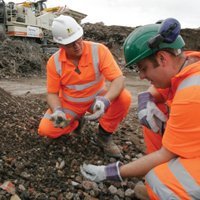
Tarmac’s business is about much more than building and maintaining roads. It is a multinational business and serves different types of customers across its business activities. To maintain its competitive advantage, Tarmac needs to have employees with high levels of skill. To support this, it provides career development opportunities across a wide variety of job roles.
Tarmac’s emphasis is on having the right people and skills. Its Change Management programme ensures that managers work closely to develop their staff. The staff benefit from developing their skills and potential through Tarmac”s positive commitment to progression. Tarmac benefits from the savings and quality enhancements arising from its process of continuous improvement.



